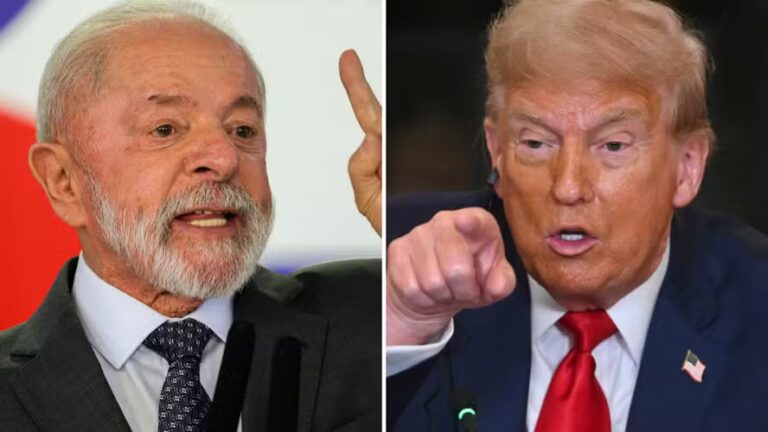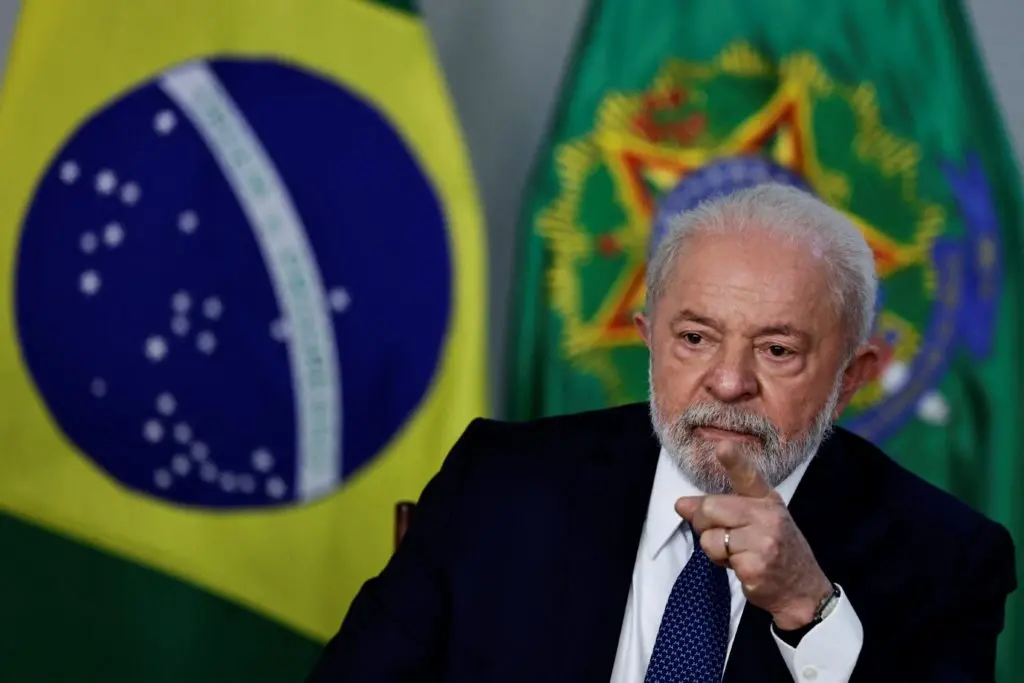Brazil-US: Critical 8 Brazilian Supreme Court Judges Targeted in US Judicial Sanctions Conflict Under Trump

Split image showing former U.S. President Donald Trump (left) and Brazilian President Luiz Inácio Lula da Silva (right), highlighting escalating diplomatic tensions over judicial interference and sovereignty. 19/7/2025
July 19, 2025 Hour: 3:30 pm
Brazil-US Judicial Sanctions Conflict escalates as Trump administration targets 8 Supreme Court judges. Lula condemns the move as a violation of judicial independence and national sovereignty.
Related:Brazil-US tariff dispute: 50% Tariff Threat Sparks Brazil’s Bold Fight Back in Growing Trade Dispute
Geopolitical Context Behind the Brazil-US Judicial Sanctions Conflict
The Brazil-US judicial sanctions conflict has taken a dramatic turn as the Trump administration announced sanctions against eight Brazilian Supreme Court judges, including Justice Alexandre de Moraes, who is overseeing a high-profile judicial investigation into former Brazilian President Jair Bolsonaro. The sanctions, which include visa bans on the judges and their families, were announced by U.S. Secretary of State Marco Rubio, sparking immediate condemnation from the Brazilian government.
President Luiz Inácio Lula da Silva denounced the move as “arbitrary intimidation” and a clear violation of Brazil’s judicial independence. “No foreign power will ever dictate the course of our institutions,” he stated via X (formerly Twitter), reinforcing the government’s stance that Brazil’s legal processes are non-negotiable and sovereign.
🔗 Reuters – Brazil-US Judicial Tensions
US Sanctions Target Brazilian Supreme Court Judges
In a controversial move, the Brazil-US judicial sanctions conflict escalated as the Trump administration sanctioned eight justices of Brazil’s Supreme Federal Court (STF), including Alexandre de Moraes, the lead judge in the investigation against former President Jair Bolsonaro. The U.S. State Department revoked the diplomatic and personal visas of the judges and their families, citing concerns over the treatment of Bolsonaro.
The sanctions were a response to the STF’s decision to impose electronic monitoring and social media restrictions on Bolsonaro, who is under investigation for allegedly planning a coup attempt to destabilize Brazil’s democratic government in January 2023.
“This is a clear act of intimidation,” said a Brazilian legal expert. “It undermines the principle of judicial independence and sets a dangerous precedent.”
🔗 Brazilian Ministry of Foreign Affairs – Official Statement
Lula Rejects US Pressure on Brazilian Judiciary

President Lula was swift in condemning the U.S. action, calling it “an unacceptable interference in our judicial system” and emphasizing that no foreign entity has the right to dictate terms to Brazil’s institutions.
“No intimidation or threat, from any country, will ever compromise the most important mission of our institutions: the defense of the rule of law,” Lula stated.
The president also issued a strong message to Washington: “A foreigner does not give orders to Brazil.” His administration has begun seeking support in multilateral forums to denounce the sanctions and protect judicial autonomy.
🔗 UN Human Rights Council – Judicial Independence Reports
Background of the Judicial Case Against Bolsonaro
The sanctions follow a judicial process initiated by Brazil’s Supreme Federal Court (STF), which is investigating Jair Bolsonaro’s alleged involvement in a coup plot aimed at destabilizing the democratically elected government of President Lula da Silva.
The court ordered electronic monitoring and social media restrictions to prevent Bolsonaro from engaging in activities that could threaten national stability. These measures are part of a broader effort to protect democratic institutions after the January 2023 insurrection that left the National Congress building damaged and the country in political turmoil.
Experts argue that the STF’s actions were fully within legal and constitutional bounds, and that the U.S. intervention risks undermining the separation of powers and judicial sovereignty.
US Retaliation and Escalating Diplomatic Tensions
The Brazil-US judicial sanctions conflict is not isolated — it comes amid rising tensions between Lula’s administration and the Trump government. In recent weeks, Trump has intensified pressure on Brasilia, demanding that Brazil halt the investigation into Bolsonaro and lift the court-ordered restrictions.
In addition to the visa sanctions, Trump has announced a 50% tariff hike on Brazilian imports, framing both actions as retaliatory measures. Analysts see this as a blurring of legal and political boundaries, with the U.S. using diplomatic tools to influence a domestic judicial process.
Brazil’s Ministry of Institutional Relations, led by Minister Gleisi Hoffmann, has called the move an “offense to the Brazilian judiciary” and a “degrading act of political conspiracy”.
Brazilian Judiciary Defends Its Autonomy
The Supreme Federal Court (STF) has reiterated that all actions taken against Bolsonaro were conducted within the framework of due process and constitutional law. Justice Alexandre de Moraes, the leading judge in the case, emphasized that the measures were preventive, aimed at preserving democratic order and preventing further destabilization.
The Brazilian Network of Jurists for Democracy issued a public statement supporting the STF, asserting that “the judicialization of politics is a guarantee of constitutional order” and that international pressure must not interfere in legitimate legal proceedings.
Legal scholars, including Professor Maria Paula Silva from the University of São Paulo, have warned that external interference in judicial processes could weaken the rule of law globally.
International Law and the Risk of Dangerous Precedent
Legal analysts have expressed concern that the Brazil-US judicial sanctions conflict could set a troubling precedent in international relations. “When a country sanctions foreign judges over domestic legal decisions, it undermines the principle of non-intervention and judicial independence,” said a constitutional law expert.
Brazil has begun formal discussions in multilateral forums to denounce the U.S. actions and rally support for the protection of its judicial sovereignty. The African Union, BRICS nations, and Latin American allies are among the key diplomatic partners being approached.
The Red Brasileña de Juristas por la Democracia has joined the call, urging the international community to respect the autonomy of judicial bodies and avoid politicizing legal proceedings.
Conclusion: A Test for Brazilian Sovereignty and Judicial Independence
The Brazil-US judicial sanctions conflict has become a litmus test for Brazil’s commitment to judicial independence and national sovereignty. President Lula’s firm response, backed by legal and diplomatic institutions, signals a clear stance: Brazil will not allow foreign interference in its internal affairs.
As the Supreme Federal Court continues its investigation, and the Brazilian government seeks international backing, the world is watching closely to see how democracies respond to external pressure on judicial systems.
Author: JMVR
Source: Agencia Brasil – Hispan TV – Brasil de Fato

